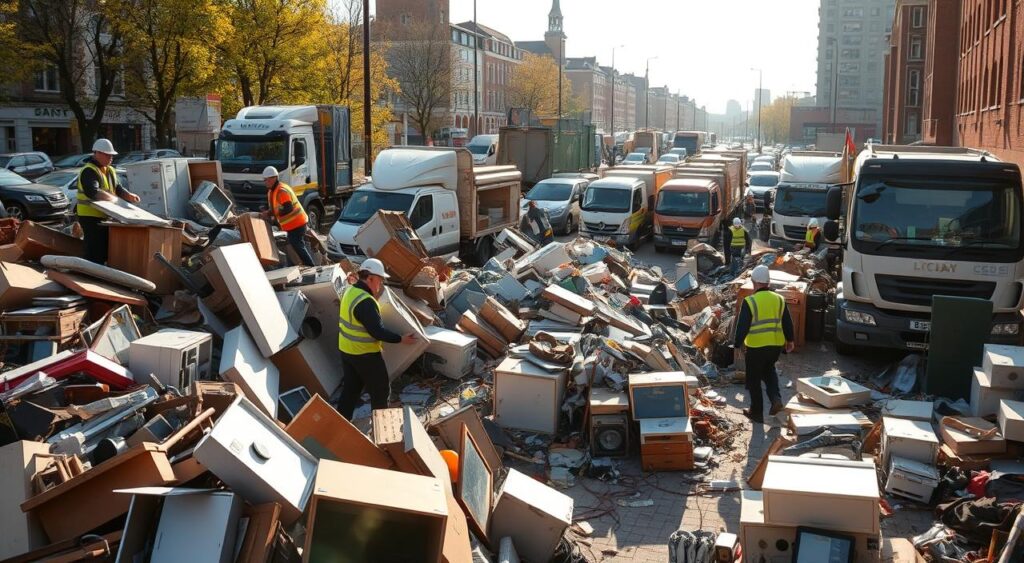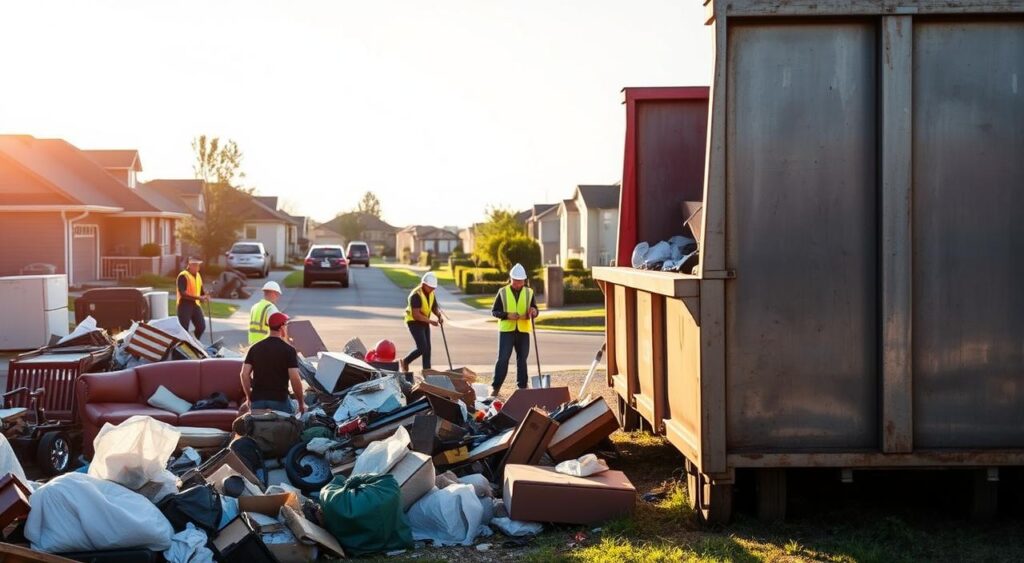Handling large-scale junk removal—whether for warehouses, offices, factories, or construction sites—requires more than manpower. It demands strategic planning, regulatory compliance, cost efficiency, and the right technology. This guide walks you through everything you need to know to manage big rubbish clearance projects responsibly and effectively across the United Kingdom.

Key Takeaways
- Strategic planning and service selection are vital for large-scale waste removal success.
- Legal compliance and sustainable disposal ensure environmental protection.
- Budgeting smartly helps avoid hidden costs and delays in project delivery.
- Technology and safety enhance waste clearance efficiency and worker protection.
- Case studies reveal real-world insights and best practices across the UK.
Understanding Large-Scale Junk Removal and Rubbish Clearance
Large-scale junk removal services cover much more than residential cleanouts. These operations often focus on:
- Demolition debris from construction or refurbishment
- Office and retail clear-outs due to relocations or closures
- Industrial waste requiring licensed disposal under UK law
Waste is removed in bulk and processed using environmentally responsible methods. Many UK companies now employ advanced tracking, waste-to-energy solutions, and AI-assisted sorting for better efficiency and reduced landfill dependency.
Planning Your Waste Removal Project
Preparation is the cornerstone of a successful clearance. Here’s a structured approach:
Site Assessment
- Identify all types of waste: general, recyclable, hazardous
- Estimate the volume using square footage and material weight
- Determine special handling needs (e.g., for asbestos, electronics)
Project Timeline
- Break the job into stages with contingency buffers
- Align tasks with business or construction schedules
Budgeting and Compliance
- Allocate funds for labour, transport, permits, and disposal fees
- Check local regulations with your council or the Environment Agency
- Work only with certified waste removal providers in the UK
Waste Removal Planning Checklist
| Task | Description |
|---|---|
| Conduct Site Survey | Evaluate waste types and quantities |
| Choose Licensed Contractors | Verify waste carrier licenses |
| Create a Disposal Timeline | Include buffer days for unexpected issues |
| Budget for Hidden Costs | Include permits, special handling, recycling fees |
Strategies for Efficient Junk and Rubbish Removal
Set Realistic, Measurable Goals
Divide the project into phases such as:
- Hazardous waste clearance
- Non-recyclable item disposal
- Recyclable material sorting
Use tools like spreadsheets or project management software to stay on track.
Select the Right Services
Look for companies experienced in large-scale clearances:
- Read online reviews on platforms like Trustpilot
- Ask for case studies or client testimonials
- Ensure compliance with UK environmental guidelines
Choosing a Waste Removal Partner in the UK
When selecting a junk removal company, verify:
- Licensing: Waste Carrier Licence and environmental accreditation
- Experience: Specific expertise in your waste type (e.g., construction, commercial)
- Reviews and References: Seek out UK firms with strong reputations for reliability
A dedicated partner offers scheduling flexibility, legal paperwork management, and tailored solutions for specific waste streams like WEEE, bulky items, or green waste.
UK Waste Compliance Guidelines
The Environmental Permitting Regulations (EPR) 2016 dictate how waste must be handled, including:
- Registration with the Environment Agency
- Adhering to permitted waste disposal routes
- Keeping waste transfer notes and audits
Failing to comply can lead to heavy fines or legal trouble.
Green Disposal Methods
Leading UK waste firms prioritise eco-friendly practices:
- Recycling of wood, metals, glass, and plastics
- Energy-from-waste initiatives using incineration
- Composting for organic waste from landscaping or food clearance
Sustainable Waste Disposal Table:
| Disposal Method | Benefits | UK Leaders |
|---|---|---|
| Recycling | Reduces landfill use | Veolia, Suez |
| Energy Recovery | Converts waste into electricity | Cory Riverside Energy |
| Composting | Eco-solution for organic material | Biogen, Envar Composting |
Budgeting for Large-Scale Waste Jobs

Effective budgeting ensures your project stays financially viable.
Cost Factors
- Type of waste: Hazardous or electronic waste costs more
- Volume and weight: Higher weight means higher transport fees
- Location: Urban pickups may cost more due to congestion
Tips for Budget Control
- Always request itemised quotes from multiple providers
- Ask about hidden fees for overtime, sorting, or weight limits
- Consider bundle deals for long-term partnerships
For instance, you could save 15–20% by booking recurring clearance services through local providers.
Prioritising Safety and Operational Efficiency
Large clearances pose real risks. Proper safety planning is essential:
Worker Safety Measures
- Mandatory training for all site staff
- PPE including gloves, steel-toe boots, and visibility gear
- Machinery checks before each shift
Boosting Efficiency
- Use GPS tracking for collection routes
- Sort waste at the source to reduce downstream work
- Schedule pickups during off-peak hours to save time
The Role of Technology in Modern Waste Management
Digital tools are reshaping how large-scale junk removal is executed across the UK.

Smart Innovations in the Field
- IoT Sensors in bins notify teams when collections are needed
- AI Software analyses waste trends to optimise future jobs
- Mobile Apps allow customers to schedule and track services
UK waste leaders like Veolia and Cleanaway are already leveraging these technologies to hit government sustainability targets and improve client service.
Real-World Examples: UK Business Case Studies
Construction Site Clearance
Company: Greenfield Contractors
Challenge: Debris blocked development timeline
Solution: 24-hour clearance with hazard waste sorters
Result: 85% waste recycled; project back on schedule
Commercial Inventory Disposal
Company: City Centre Retailer
Challenge: 12 tonnes of excess stock
Solution: Skip hire with tailored separation
Result: £1,200 saved via recycling incentives
Customer Reviews Speak Volumes
- “EcoClear offered full transparency and saved us money.” – Tenant in Bristol
- “Six hours and our entire site was cleared—excellent job!” – Factory Owner, Manchester
These stories show how professional junk removal partners improve results with speed, safety, and environmental care.
Conclusion
Tackling large-scale junk removal in the UK involves much more than hiring a van. It requires legal compliance, eco-conscious disposal, budgeting insight, and strategic service selection. With the support of licensed UK waste carriers and modern technologies, even the largest projects become manageable.
By planning carefully, choosing reputable partners, and embracing sustainability, you can reduce waste impact, cut costs, and meet your environmental responsibilities.